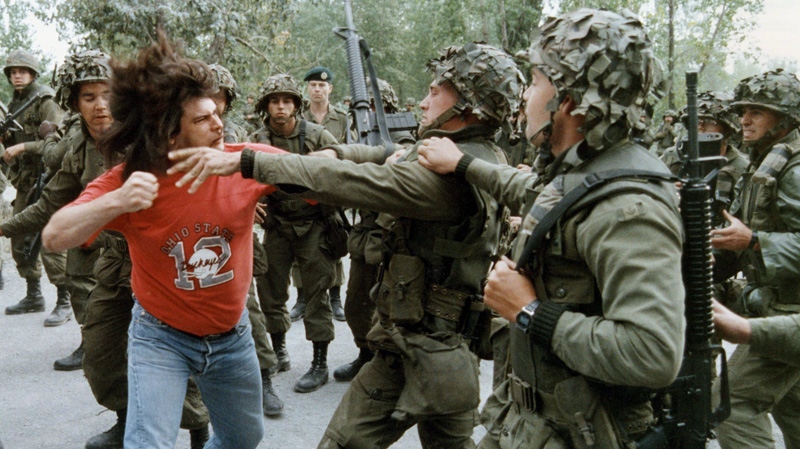KANESATAKE, Que. - Slow-moving vehicles waving flags and sounding their horns marked the 30th anniversary of the Oka crisis on Saturday, with community activists urging real reconciliation and a settlement to the long-standing land claim that remains unresolved three decades later.
``Land back, we want our land back, that's part of reconciliation,'' said Ellen Gabriel, a Mohawk activist and spokesperson for the People of the Longhouse in Kanesatake.
``Giving our land back and having us part of the decision making process on what happens on our land, that's reconciliation, and it has to be done in a decolonized framework, in a way that respects Indigenous laws, that respects the rights of the women who are the title holders of the land you're standing on.''
The commemoration was to honour those community members who played a critical role during in the summer of 1990, when the country's attention was on Oka, a small town about 50 kilometres northwest of Montreal.
``The stand taken that summer became an important symbol for peoples across North America, inspiring them to take similar stands against the emancipation of their ancestral lands,'' Gabriel said.

CTV News Montreal, File Photo 1990
Thirty years ago Saturday, on July 11, 1990, Quebec provincial police moved in on a barricade erected by Mohawks that March to protest the planned expansion of a golf course and development on what is ancestral land.
A provincial police officer was killed and the situation escalated into a tense, 78-day standoff between Mohawks and Canadian soldiers.
``Our basic human rights were violated by the Surete du Quebec (provincial police), the Canadian army, condoned by the governments of Quebec and Canada, pushed forward by private enterprises including those within the municipality of Oka,'' Gabriel said.
The 1990 siege ended when the expansion was cancelled and the barricades came down.
Three decades later, however, the underlying land dispute remains unresolved.
The trio of federal ministers that oversee Crown-Indigenous Relations and Northern Affairs Canada said in a statement the pain and trauma inflicted continues to this day.
``Today, we must acknowledge that progress in our relationship has been unequal, halting, and often, far too slow,'' the government said, adding mistakes must be learned from.
``We must resolve to never order the deployment of the Canadian Armed Forces against Indigenous Peoples, as we remain deeply committed to dialogue and peaceful resolution of conflict.''
Like the conversation around residential schools and murdered and missing Indigenous women, Gabriel said the issue in Kanesatake won't be an easy one.
``It's going to be an uncomfortable discussion,'' Gabriel said. ``But when are we actually going to see actions and have a voice in what reconciliation is going to be.''
Under a light rain, a rolling convoy made its way through the community to a nearby provincial park, passing by a real-estate development in Oka that has been a flash point in recent years, before returning home.
A similar event took place Saturday in Kahnawake Mohawk Reserve, southwest of Montreal, where a rolling convoy of vehicles from that community stopped briefly on the Mercier Bridge, which was barricaded in 1990 in solidarity for those manning posts in Oka.

CTV News Montreal, File Photo 1990
``A lot of people joined in and it lasted a good two hours, driving on the highway at about 10 kilometres an hour,'' said Joe Deom, a sub-chief in the Bear clan.
``I felt it good about the attention our own people had to this anniversary _ a lot of our own people weren't even born at that time, so it's good that they're enthusiastic about it.''
Among those present in Kanesatake on Saturday was NDP Leader Jagmeet Singh and Manitoba NDP MP Leah Gazan, invited by the Longhouse.
Singh said thirty years removed, lessons clearly haven't been learned.
``The problem was created by Canada,'' Singh said. ``It's 2020, with the resources this country has, there's no excuse why this cannot be resolved.''
In many ways, Gabriel said, the situation remains unchanged _ land rights aren't respected and systemic racism remains at the core of Indigenous people's relationship with governments.
Ghislain Picard, the grand chief of the Quebec Assembly of First Nations, marked the 30th anniversary with an open letter calling on Quebec Premier Francois Legault to change his tune on systemic racism, which the premier has said repeatedly doesn't exist.
``Systemic racism and discrimination are not just concepts or theoretical notions,'' Picard wrote. ``Rather, they are a set of facts and behaviours and we should not be afraid to name and denounce them if we are genuinely willing to correct them.''

CTV News Montreal, File Photo 1990
This report by The Canadian Press was first published July 11, 2020.